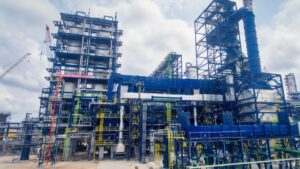
NUPRC gazettes five oil industry regulations, completes six others
The Nigerian Upstream Petroleum Regulatory Commission (NUPRC) says five petroleum industry regulations have been gazetted while six others have been finalised and ready for gazetting.
Commission Chief Executive, NUPRC, Mr Gbenga Komolafe, disclosed this on Monday in Abuja at the third Phase of its Consultation with Stakeholders on Draft Regulations Development as mandated by Section 216 of the Petroleum Industry Act (PIA).
Komolafe listed the regulations gazetted as, the Nigeria Upstream Petroleum Host Community Development Trust regulations; Royalty Regulations; Domestic Gas Delivery Obligation Regulations; Nigeria Conversion and Renewal {Licence and Lease} Regulations and Petroleum Licensing Round Regulations.
The CCE, represented by an Executive Commissioner, NUPRC, Mr Habib Nuhu, recalled that thirteen draft regulations were presented for discussion during its first and second phase of consultations with stakeholders in 2022.
He said the inputs of the stakeholders from the engagement were incorporated, where necessary, in the draft regulations.
“Thereafter, the regulations were forwarded to the Honourable Attorney General of the Federation and Minister of Justice for vetting, legislative standardisation, and approval.
“I am happy to inform you that five of the regulations have been gazetted while the remaining six have been finalised and ready for gazetting,” he said.
In furtherance of the above and in compliance with Section 216(4)(g) of the PIA 2021, he said the commission organised yet another Stakeholder Consultation prior to finalising more draft regulations.
He listed them as the Upstream Petroleum Measurement Regulations; Advance Cargo Declaration Regulations; Significant Discovery Regulations; Gas Flaring, Venting and Methane Emissions (Prevention of waste and Pollutions) Regulations and Domestic Crude Oil Supply Obligation Regulations.
The CCE reiterated that the process of formulating the above regulations has been a rigorous and strenuous exercise.
“They are products of critical thinking and evaluation, and hard work by the Commission’s Regulation development Team and the Presidential Implementation Committee on PIA.
“In spite of this however, the process is not complete until the stakeholders’ critical inputs are obtained, discussed, and incorporated, where necessary, in the Regulations,” he added.
He called for a healthy, robust, and intellectual discussion on the regulations during the syndicate sessions to come out with robust regulations with best international best standard.
He said it would ensure that regulations and key policies necessitated by the PIA were developed and gazetted timely so that the industry operators could align their operations with the PIA provisions as quickly as possible.
Executive Commissioner, Economic Regulation and Strategy Planning, NUPRC, Mr Kelechi Ofoegbu, while providing insight into the regulations explained that the measurement regulations would give the regulator the capability of knowing exactly what was produced by different upstream oil operators.
He said, it became necessary to understand the regulation because through the years of production in Nigeria, there has been the quest to know how much we produce and how much we consume, from upstream to midstream to downstream.
“If you ask 10 people in the industry what are your production and consumption numbers, you will get 10 different responses. So nobody takes us seriously, whether is on gas flaring, or whatever. I think that is enough already,” he said.
The engagement had in attendance the Oil Producers Trade Section, Independent Petroleum Producers Association, IOCs, Indigenous Operators among others.



